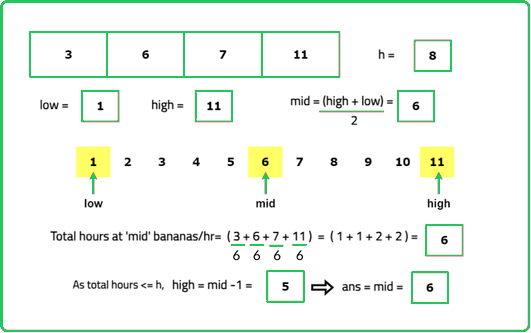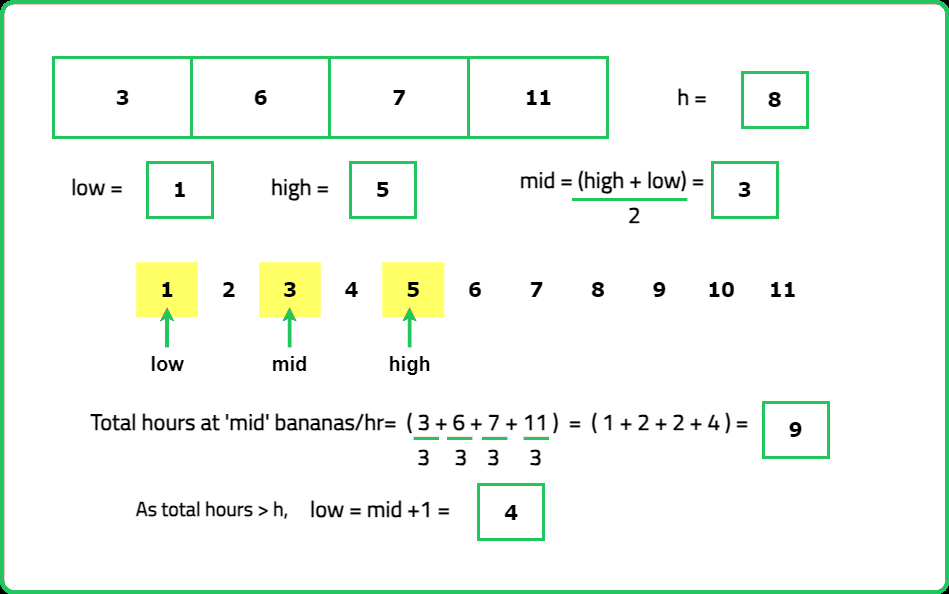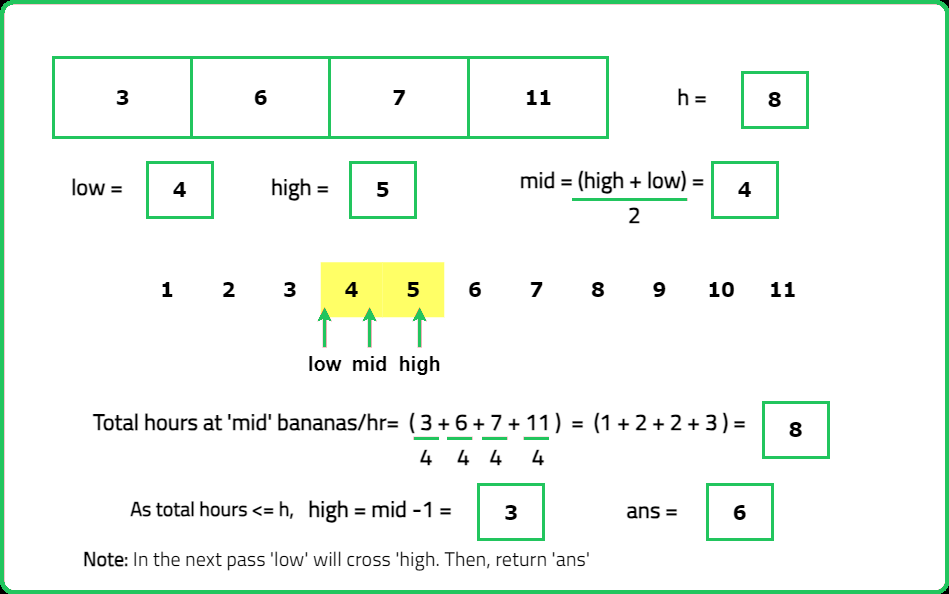12345678910111213141516171819202122232425262728293031323334353637383940414243444546474849505152535455565758596061626364656667
#include <bits/stdc++.h>
using namespace std;
class Solution {
private:
/* Helper function to find the
maximum element in the vector */
int findMax(vector<int>& nums) {
int maxi = INT_MIN;
int n = nums.size();
// Find the maximum element
for (int i = 0; i < n; i++) {
maxi = max(maxi, nums[i]);
}
return maxi;
}
/* Helper function to calculate total
hours required at given hourly rate */
int calculateTotalHours(vector<int>& nums, int hourly) {
int totalH = 0;
int n = nums.size();
// Calculate total hours required
for (int i = 0; i < n; i++) {
totalH += ceil((double) nums[i] / (double) hourly);
}
return totalH;
}
public:
/* Function to find the
minimum rate to eat bananas */
int minimumRateToEatBananas(vector<int>& nums, int h) {
// Initialize binary search bounds
int low = 1, high = findMax(nums);
// Apply binary search
while (low <= high) {
int mid = (low + high) / 2;
int totalH = calculateTotalHours(nums, mid);
if (totalH <= h) {
high = mid - 1;
} else {
low = mid + 1;
}
}
return low;
}
};
int main() {
vector<int> nums = {7, 15, 6, 3};
int h = 8;
// Create an object of the Solution class
Solution sol;
int ans = sol.minimumRateToEatBananas(nums, h);
// Print the result
cout << "Koko should eat at least " << ans << " bananas/hr.\n";
return 0;
}
1234567891011121314151617181920212223242526272829303132333435363738394041424344454647484950515253545556575859606162
import java.util.*;
class Solution {
/* Helper function to find the
maximum element in the array*/
private int findMax(int[] nums) {
int maxi = Integer.MIN_VALUE;
int n = nums.length;
// Find the maximum element
for (int i = 0; i < n; i++) {
maxi = Math.max(maxi, nums[i]);
}
return maxi;
}
/* Helper function to calculate total
hours required at given hourly rate*/
private int calculateTotalHours(int[] nums, int hourly) {
int totalH = 0;
int n = nums.length;
// Calculate total hours required
for (int i = 0; i < n; i++) {
totalH += Math.ceil((double) nums[i] / (double) hourly);
}
return totalH;
}
/* Function to find the
minimum rate to eat bananas*/
public int minimumRateToEatBananas(int[] nums, int h) {
// Initialize binary search bounds
int low = 1, high = findMax(nums);
// Apply binary search
while (low <= high) {
int mid = (low + high) / 2;
int totalH = calculateTotalHours(nums, mid);
if (totalH <= h) {
high = mid - 1;
} else {
low = mid + 1;
}
}
return low;
}
public static void main(String[] args) {
int[] nums = {7, 15, 6, 3};
int h = 8;
// Create an object of the Solution class
Solution sol = new Solution();
int ans = sol.minimumRateToEatBananas(nums, h);
// Print the result
System.out.println("Koko should eat at least " + ans + " bananas/hr.");
}
}
1234567891011121314151617181920212223242526272829303132333435363738394041424344454647484950515253
import math
class Solution:
""" Helper function to find the
maximum element in the array"""
def findMax(self, nums):
maxi = float('-inf')
n = len(nums)
# Find the maximum element
for i in range(n):
maxi = max(maxi, nums[i])
return maxi
""" Function to calculate total hours
required at given hourly rate"""
def calculateTotalHours(self, nums, hourly):
totalH = 0
n = len(nums)
# Calculate total hours required
for i in range(n):
totalH += math.ceil(nums[i] / hourly)
return totalH
""" Function to find the
minimum rate to eat bananas"""
def minimumRateToEatBananas(self, nums, h):
# Initialize binary search bounds
low, high = 1, self.findMax(nums)
# Apply binary search
while low <= high:
mid = (low + high) // 2
totalH = self.calculateTotalHours(nums, mid)
if totalH <= h:
high = mid - 1
else:
low = mid + 1
return low
if __name__ == "__main__":
nums = [7, 15, 6, 3]
h = 8
# Create an object of the Solution class
sol = Solution()
ans = sol.minimumRateToEatBananas(nums, h)
# Print the result
print(f"Koko should eat at least {ans} bananas/hr.")
12345678910111213141516171819202122232425262728293031323334353637383940414243444546474849505152535455565758
class Solution {
/* Helper function to find the
maximum element in the array */
findMax(nums) {
let maxi = Number.MIN_SAFE_INTEGER;
const n = nums.length;
// Find the maximum element
for (let i = 0; i < n; i++) {
maxi = Math.max(maxi, nums[i]);
}
return maxi;
}
/*Helper function to calculate total
hours required at given hourly rate*/
calculateTotalHours(nums, hourly) {
let totalH = 0;
const n = nums.length;
// Calculate total hours required
for (let i = 0; i < n; i++) {
totalH += Math.ceil(nums[i] / hourly);
}
return totalH;
}
/* Function to find the
minimum rate to eat bananas*/
minimumRateToEatBananas(nums, h) {
// Initialize binary search bounds
let low = 1, high = this.findMax(nums);
// Apply binary search
while (low <= high) {
const mid = Math.floor((low + high) / 2);
const totalH = this.calculateTotalHours(nums, mid);
if (totalH <= h) {
high = mid - 1;
} else {
low = mid + 1;
}
}
return low;
}
}
const nums = [7, 15, 6, 3];
const h = 8;
//Create an instance of Solution class
const sol = new Solution();
const ans = sol.minimumRateToEatBananas(nums, h);
// Print the result
console.log(`Koko should eat at least ${ans} bananas/hr.`);


